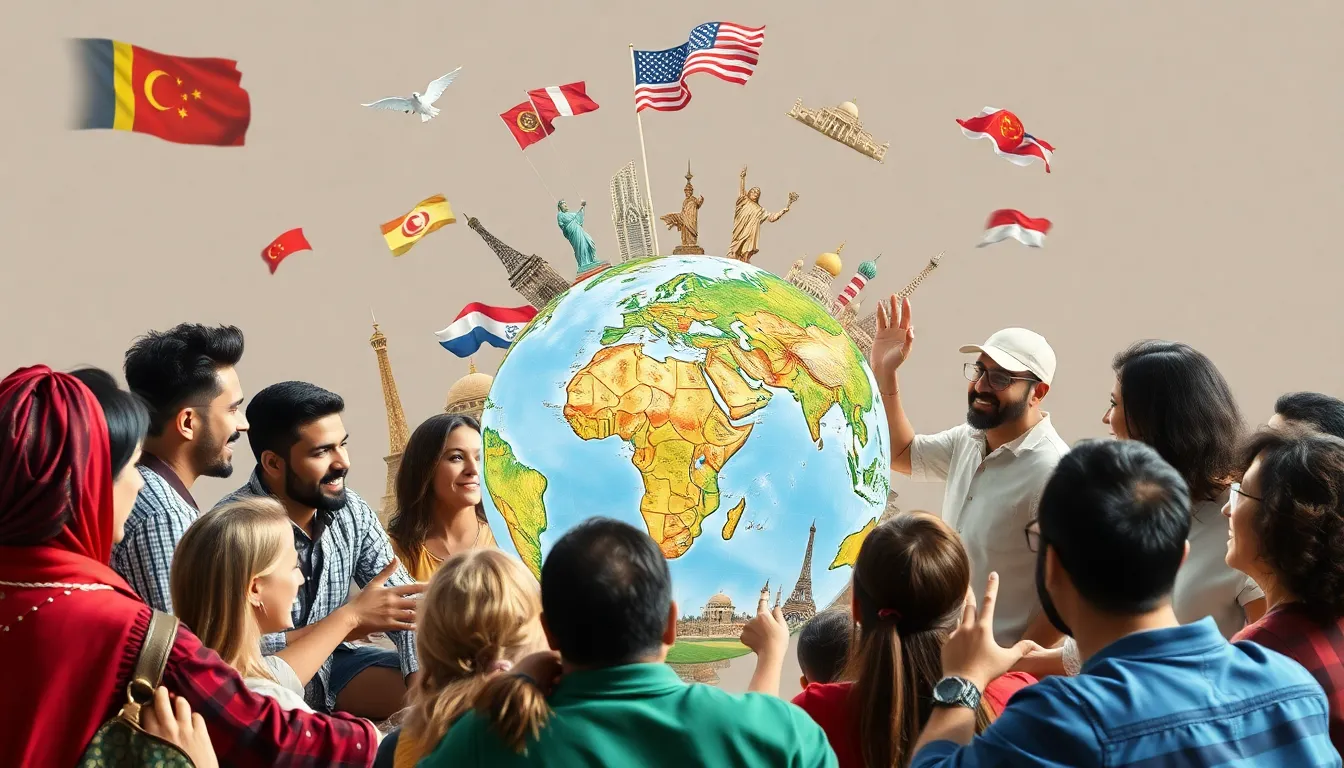Table of Contents
ToggleIn a world that’s more interconnected than ever, international news plays a crucial role in shaping public opinion and understanding global events. From political upheavals to economic developments and cultural exchanges, staying informed about what’s happening beyond one’s borders is essential. It helps individuals grasp the complexities of international relations and the impact these events have on their daily lives.
With the rapid rise of digital media, access to international news has never been easier. However, the challenge lies in discerning credible sources and navigating the sheer volume of information available. This article explores the significance of international news, the factors influencing its coverage, and the ways individuals can stay updated on global happenings. Understanding these dynamics not only enriches knowledge but also fosters a sense of global citizenship.
Overview of International News
International news encompasses stories and events that occur outside a country’s borders, impacting citizens globally. It includes political events, economic shifts, environmental issues, and cultural movements. These news segments provide crucial insights into how global trends and policies affect local communities.
International news influences public perception, shaping attitudes towards foreign relations and policies. For instance, reporting on international conflicts can evoke empathy and affect political opinions. Coverage of trade agreements impacts economic understanding and encourages discussions on local employment and industry.
Access to international news has expanded due to digital platforms. Major news organizations, such as BBC, Reuters, and Al Jazeera, offer real-time updates, while social media allows for diverse perspectives. However, discerning credible sources remains essential amid misinformation. Individuals should prioritize reputable outlets and fact-checking services to stay informed.
Staying updated on international news fosters a sense of global citizenship. Engaging with various viewpoints promotes awareness of cultural differences and shared challenges. Understanding international dynamics enhances one’s ability to participate in discussions, influencing local and global decision-making processes.
Importance of International News

International news plays a critical role in fostering awareness of global events and shaping informed individuals. Understanding international news equips people with the knowledge necessary to navigate an interconnected world.
Global Awareness
Global awareness relies on access to international news. Recognizing political changes, economic developments, and environmental challenges enables individuals to understand how events abroad affect local communities. Keeping informed about international situations promotes engagement in global issues and enhances the ability to participate in informed discussions. Studies show that individuals knowledgeable about international affairs tend to hold more empathetic views towards foreign cultures and policies.
Cultural Understanding
Cultural understanding develops through exposure to international news. News stories highlight cultural events, traditions, and issues, providing insights into diverse lifestyles. This understanding fosters respect and reduces stereotypes, facilitating more effective communication across cultures. By engaging with a variety of viewpoints presented through reputable news sources, individuals acquire a balanced perspective that enriches their interactions both locally and globally. Notably, cultural exchanges emphasized in international news promote tolerance and collaboration, further bridging gaps between different societies.
Sources of International News
Access to international news derives from various channels, including traditional media and digital platforms. Each source plays a significant role in informing the public about global events.
Traditional Media
Traditional media, such as television, radio, and print, continues to serve as a primary source for international news. Major outlets like BBC, CNN, and Reuters provide comprehensive coverage of global events, ensuring timely updates. These organizations often employ correspondents positioned around the world, allowing them to report firsthand on significant developments. Their established credibility and commitment to journalistic standards make them reliable sources for understanding complex international issues. Audiences can trust these platforms to deliver in-depth analysis and expert opinions on various topics, ranging from political changes to economic trends.
Digital Platforms
Digital platforms have transformed how individuals access international news. Websites and apps enable real-time updates and a broader range of viewpoints. Popular platforms, such as Al Jazeera, The Guardian, and The New York Times, offer online articles, videos, and podcasts that cater to diverse audiences. Social media platforms, including Twitter, Facebook, and Instagram, facilitate the rapid dissemination of news and user-generated content, allowing individuals to engage in discussions about global issues. While these platforms provide valuable insights, it’s vital to critically evaluate the information and verify the credibility of sources to mitigate the effects of misinformation.
Challenges in Reporting International News
Reporting international news presents significant challenges that can hinder the accuracy and reliability of information. Two primary concerns include misinformation and geopolitical influences.
Misinformation and Fake News
Misinformation and fake news complicate the reporting of international events. Digital platforms often amplify unverified claims, making it difficult for journalists to discern credible information. Journalists face the responsibility of verifying sources and fact-checking content before dissemination. The rapid spread of false narratives can lead to public confusion and distrust in media outlets. Case studies show that misleading headlines can shape perceptions of vital global issues, prompting the need for stringent fact-checking practices. To ensure they provide trustworthy news, organizations need to implement robust verification processes for their reporting.
Geopolitical Influences
Geopolitical influences substantially affect international news coverage. National interests often dictate the narrative surrounding global events, leading to biased reporting. Journalists must navigate complex diplomatic relations, which may pressure them to alter the portrayal of sensitive topics. Certain governments may restrict access to information or leverage propaganda, undermining independent journalism. The interplay between local and international politics further complicates the portrayal of global events, as journalists strive for neutrality while facing external pressures. An awareness of these influences is essential for consuming international news critically and understanding the broader context behind reported stories.
The Future of International News
The future of international news hinges on technological advancements and evolving audience expectations. Digital innovations, such as artificial intelligence and machine learning, streamline news delivery, allowing for real-time reporting that adapts to viewer preferences. Media outlets are increasingly utilizing data-driven insights to tailor content, ensuring relevance and engagement.
The demand for diverse perspectives continues to grow. International news platforms must embrace inclusivity, ensuring underrepresented voices gain visibility. This approach fosters a more comprehensive understanding of global issues while appealing to a broader audience.
Fact-checking remains crucial as misinformation proliferates. The future relies on collaboration between news organizations and independent fact-checking groups to maintain credibility. Enhanced transparency in reporting processes builds trust with audiences, encouraging informed engagement.
Audience participation also shapes the landscape of international news. User-generated content, such as citizen journalism, contributes complementary viewpoints and provides grassroots insights into global events. Media organizations must adapt to highlight quality contributions while maintaining journalistic standards.
Sustainability in news production becomes increasingly important. Adaptations to funding models, including subscription services and crowdfunding, cater to audience preferences while ensuring financial viability. Innovative partnerships with educational institutions or NGOs may enhance content production and audience reach.
Accessibility to international news is essential. Enhancements in multilingual reporting cater to non-English speakers and broaden audience access. Investigative journalism that focuses on local impacts of global issues empowers communities and fosters meaningful dialogue.
The interplay of technology, audience expectations, and ethical journalism will define the future of international news. By prioritizing accuracy, inclusiveness, and sustainability, media organizations can navigate challenges while enriching the public’s understanding of an interconnected world.
Staying informed about international news is essential in today’s global landscape. It shapes perceptions and encourages engagement with pressing issues that affect communities worldwide. By prioritizing credible sources and embracing diverse viewpoints, individuals can cultivate a well-rounded understanding of global affairs.
As technology continues to evolve, the future of international news promises greater accessibility and inclusivity. This shift not only enhances public discourse but also fosters a sense of global citizenship. Engaging with international news equips individuals to navigate the complexities of our interconnected world, promoting informed discussions that bridge cultural divides and address shared challenges.




